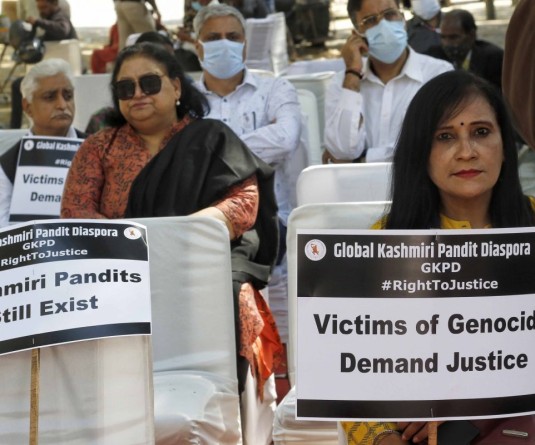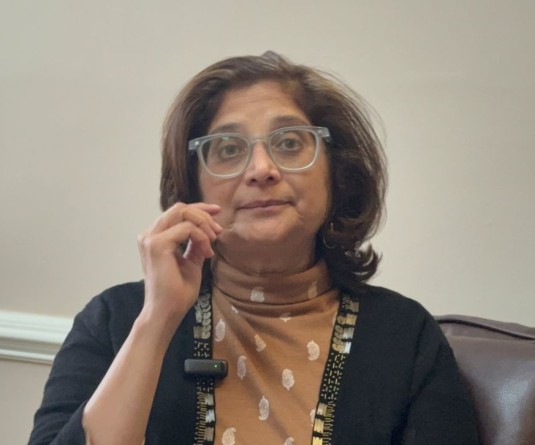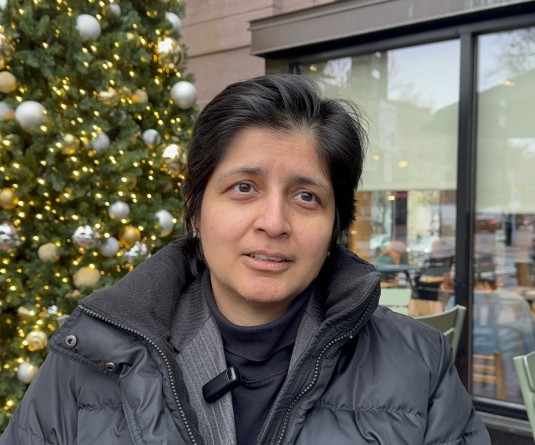Arts are feared by the powers that be: Sanjna Kapoor

March 22 March 22 (IANSlife) "The arts are wonderfully challenging and difficult to engage with or tackle, depending on your point of view. They are by nature, reflections of a nations identity -- at times displaying the glaring darkness in a society or celebrating the unique beauty and genius of a land and its people. They forever pose questions and provoke answers. So, the challenge is how do the arts stay independent of the powers that be, of politicians, bureaucrats, corporates and their agendas?" Asks theatre person Sanjna Kapoor, who was recently conferred with the prestigeous 'The Ordre des Arts et des Lettres (Knight of the Order of Arts and Letters) by the French government for her outstanding contribution to the field of theatre.
Stressing that they (the arts) are like education, and if education were to truly achieve its aim of creating young adults who are critical thinkers, with discerning approaches and questioning minds, then most people in positions of power would fear such youth. "Thus, the arts are slightly feared by the powers that be," she tells IANS.
Talking about the recent honour conferred by the French government, Kapoor says it is always a happy occasion to know one's work is acknowledged and celebrated. "It feels like a pat on one's back of encouragement that energises one and enables one to continue towards realising one's dream. Especially in a climate like in India, that has absolutely no support or infrastructure towards seeding arts across our urban landscapes."
Kapoor, who ran the Prithvi theatre in Mumbai from 1993 to 2012, making it a vibrant cultural space and co-founded the theatre group 'Junoon' along with Sameera Iyengar feels that they are at an important juncture in the life of eJunoon. "Several factors, some of our own making and some beyond our control have forced us to pause and relook at our plans, and to strategically move ahead. The next few months will be critical in allowing us to envisage the next four years of the group's life. We plan in four-year bursts, as we were born on a leap day eight years ago i.e. Feb 29, 2012."
Insisting that for far too long, India has worked with systems of patronage towards the arts, and it is now time to change this decadent and obsolete approach, she feels that the arts rarely need handouts or sops from the state. "What they need are for the ground to be nurtured that will seed their work in a sustainable manner, and embed it into the daily lives of our society, wherein the value of the arts will be recognised, understood and celebrated."
Stating that theatre in Maharashtra is celebrated and may wield social power while artists in Bengal are revered and respected, but alongside this, we have art forms, languages and stories that are vanishing at a rapid rate, Kapoor, a pass-out from the Herbert Berghof Studio in New-York, where she realised that he true passion was in theatre, says, "What we need is to create centres of advocacy that debate and discover ways to enable this. "With the understanding that no one way need suit the entire country, and we may need to think of multitudinous methods to reach the same aim, taking local cultures and practices into consideration. The artist community needs to advocate for this to happen."
Kapoor, who actively engaged with corporates like Coke and Ceat a decade back for theatre feels that is essential to try and build relationship beyond simply being transactional. "One has to see where true value can be sought by both partners. It is not an easy task, but then no 'relationships' are easy," she adds.
Talking about the very few theatre festivals in the country, even as literature festivals increase their footprint all over, including small town India, she opines that the latter turn out to be much cheaper than a theatre festival which is people-intensive and can be tech-heavy which can both be expensive. "Not to mention, we have also lost the panache of our annual iconic theatre festivals due to a lack of vision. But of course, we do have festivals like the government run ITFOK festival (International Theatre Festival of Kerala) in Thrissur, and more rural independent festivals like Theatre Festival Under the Sal Trees in Assam run by the Badungduppa Kala Kendra."
Even as the education system has finally accepted the value of the arts in children's education, she feels that it is as essential that Teacher Training programmes are designed to address this new subject, as they address training for teachers of the sciences, languages etc.
"What should not happen is that young people who come out of drama schools be expected to teach children theatre in schools. This is absurd unless the drama schools (which are so few and far between) have specialised courses on education that look at the curriculum and most importantly how to interact with children. Maya Krishan Rao began an ambitious and valuable programme at the Shiv Nadar University called TEST : Theatre for Education and Social Transformation, in which that offered teachers a one year course in theatre so they could use theatre in the classroom as well as teach theatre in the school."
As the conversation veers towards the need to have more theatre training institutes across the country, Kapoor feels that when we set up specialised higher educational institutions, there is an idea of where this learning will take the young students in their lives. "If we believe that theatre institutions are necessary across the country, which is a laudable idea, what will these young graduates do? Where will they work? What are their opportunities? I personally believe there is a huge opportunity to hone these magnificent talents across our country, through local interventions of this kind. But without simultaneously building the infrastructure, the ecosystem, the support systems that can enable professionalism or innovative sustainability, this is a dead end gamble."
Believing that art by virtue of its nature deals with aesthetics, ideas, opening up worlds, and provoking different ways of imagining our world, with posing difficult questions, she feels that using one's art to ignite new thoughts is central to creative expression.
"The challenge is that we have created a society that knows no other way of expressing dissent of ideas other than through violence, bullying or terror. This must change. We must evolve ways of expressing our opposing views that reflect our civilisation and not the basest of our human nature. Unfortunately, we have zero political will to work towards this change."
(This article is a website exclusive and cannot be reproduced without the permission of IANSlife)
Sukant Deepak can be contacted at sukant.d@ians.in






